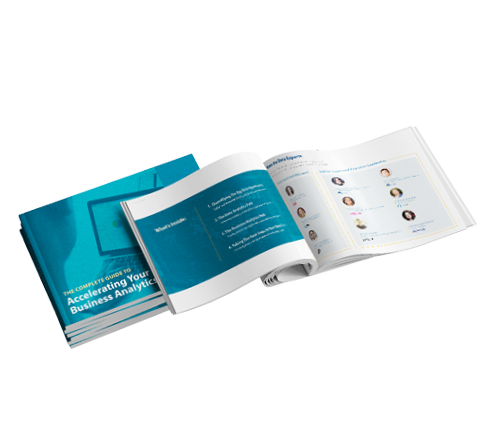Request Information
We're Sorry
There was an unexpected error with the form (your web browser was unable to retrieve some required data from our servers). This kind of error may occur if you have temporarily lost your internet connection. If you're able to verify that your internet connection is stable and the error persists, the Franklin University Help Desk is available to assist you at helpdesk@franklin.edu, 614.947.6682 (local), or 1.866.435.7006 (toll free).
Just a moment while we process your submission.

Top 8 Data Analytics Certifications to Drive Your Career
In today’s data-driven world, every company in every industry needs to use information effectively to drive profits, meet customer demands and stay competitive. But the rise of big data and advanced analytics means that to use data effectively, organizations need people with specialized skills and knowledge. Currently, 73.8% of IT professionals agree that there is a shortage of qualified data professionals, according to a recent survey of IT leaders by Adstrada. Lightcast Analytics expects demand for data analysts to rise by 18.4% by 2032, meaning that the talent crunch is unlikely to ease anytime soon.
One way to become a data analyst or to advance in the field is by earning certifications. However, with a number of options to choose from, it’s essential to carefully assess which certification is right for you.

What Is a Data Analytics Certification?
A data analytics certification is a credential demonstrating mastery of a particular skill or knowledge base. While the terms certification and certificate are sometimes used interchangeably, certifications are typically earned by passing an exam administered by a recognized industry body. In contrast, certificates come from completing a specific course or series of courses, often through an educational institution. Often, the two go hand-in-hand, with a certificate program leading to a certification exam.
In the world of data analytics, many certifications are issued by the companies behind popular software or analysis tools, like Google, Amazon Web Services and IBM. Some are geared toward people learning data analytics for the first time, while others are designed for professionals with many years of technical work under their belts. Data analytics certification costs vary – some qualifications can come in at less than $100 if earned through self-study alone. Others may cost thousands once all the required exams and preparatory materials are considered.
Get a FREE roadmap that includes insider information to help you maximize the many opportunities in the fast-growing field of Big Data.
Who Should Get a Data Analytics Certification?
“Earning data analytics degrees and certifications can help individuals gain the knowledge and skills needed to advance their careers in data analytics and demonstrate their expertise to potential employers,” says Dr. Nimet Alpay, M.S. in Data Analytics program chair at Franklin University.
Certifications are particularly valuable for people seeking to enter the field for the first time, moving into a new role, or applying to jobs that require in-demand skills such as SQL, Tableau and Python. They’re also an excellent way to start building familiarity with data analytics topics without the cost and time commitment of a degree. In some cases, certification preparation programs can even help you earn credits toward a future master’s. If you’re already embarking on a degree, certification can be an excellent complement to coursework and offers a way to demonstrate that you’ve achieved a certain level of skill mastery.
Since the certification process typically involves a significant amount of self-study, as well as varying fees, it’s wise to talk to other professionals in the field and read job postings to explore which credentials can help you reach your goals.

What Are the Top Data Analytics Certifications?
There are dozens of data-related certifications in the marketplace, and choosing which exam or program to invest in can feel overwhelming. One way to narrow down your options is to focus on the most in-demand skills for data analysts. The following certifications can help you attain those skills and are highly sought by employers.
- Google Data Analytics Professional Certificate: This certificate program, which requires no degree or prior experience, offers a deep dive into data collection, transformation and organization using tools including SQL, R programming and Tableau. The module is available through the Franklin University's partnership with Coursera and typically takes 4-5 months to complete, at a cost of $35 per month.
- AWS Certified Data Analytics – Specialty: This certification validates a candidate's expertise in designing and implementing Amazon Web Services (AWS) tools to derive value from data. You can earn this qualification by passing an examination, which costs $300 to take. Amazon recommends that professionals take the exam once they have worked in data analytics for at least five years, with two years of AWS experience. Specific coursework is not required, but Amazon offers paid preparation classes.
- IBM Data Analyst Certificate: IBM’s certificate program delivers foundational data analysis knowledge and tools and does not require any prior background in the field. In the program, you’ll learn how to create visualizations using IBM Cognos Analytics and Excel and develop familiarity with databases, SQL and Python. The certificate, which is available through the Franklin University's partnership with Coursera, typically takes 4-5 months to complete and costs $35 per month.
- Microsoft Certified: Power BI Data Analyst Associate: This certification from Microsoft demonstrates a candidate’s ability to use the Power BI tool to gather, analyze and visualize business data. It is particularly well suited for professionals who wish to work as business intelligence analysts or in similar roles. While Microsoft does not require specific coursework, the company does offer a number of online training resources to help test-takers prepare. The examination itself costs $165.
- Tableau Desktop Specialist Certification: This certification, earned by passing an examination at the cost of $100, demonstrates proficiency in the data visualization techniques offered by Tableau software. While there are no required prerequisites for the exam, the company does offer paid preparation courses. Tableau recommends that professionals spend at least three months using the tool regularly before they take the exam.
- Microsoft Certified: Azure Data Scientist Associate: This certification validates a candidate's expertise in designing and implementing machine learning models on the Microsoft Azure cloud platform. Earned by passing an examination that costs $165, it’s suitable for data scientists with significant experience using Azure Machine Learning and MLflow. If you are new to these tools, you can start your journey with Azure through Microsoft Azure Professional Certificate Program. The course typically takes 3-4 months to complete and costs $35 per month as part of Franklin University’s partnership with Coursera.
- Google Cloud Certified - Professional Data Engineer: This certification validates a candidate's expertise in designing and implementing data processing systems, data analysis and machine learning models on the Google Cloud Platform. It is earned through an examination which costs $200. No prerequisites are required to achieve this credential, but preparation courses like the one Franklin University offers in partnership with Coursera can help you hone your skills and get ready for the exam.
- SAS Certified Data Scientist: SAS offers several certifications that demonstrate proficiency in specific areas of data analytics, such as data curation, advanced analytics and machine learning. The Certified Data Science credential, which requires the completion of several unique certifications, is suitable for data scientists with significant experience in the field. The individual certifications, which can also be earned outside of the Certified Data Scientist Track, each require several examinations at varying costs.
In addition to these certifications, consider microcredentials that demonstrate your understanding of topics and tools like R, Python, or machine learning. Microcredentials are especially helpful for people transitioning into the field or seeking new roles requiring specific software or programming languages.
Take the Next Step in Your Data Analytics Career
Learning complex data analysis techniques and tools is a challenge – especially for busy professionals. That’s why many data analysts pursue certificate programs or certification prep courses to build the skills needed to earn coveted industry qualifications. The FranklinWORKS Marketplace offers several high-quality, inexpensive online courses to help you learn to manage data, glean insights from business intelligence and use in-demand software. Several of these courses are explicitly aimed at preparation for industry certification.
If you’re looking for a more comprehensive introduction to data analysis, consider Franklin’s Graduate Certificate in Data Analysis. The eight-month online program includes coursework in statistics, databases, data visualization, data mining and big data technologies. In addition to building the foundational knowledge necessary to pursue industry certifications, you’ll earn credit toward three different master’s degrees at Franklin: the M.S. in Data Analytics, M.S. in Business Analytics and M.S. in Health Informatics.
Learn more about how Franklin can help you advance your career in data analytics.





